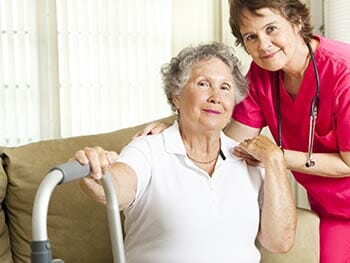
About Rein Tideiksaar: Dr. Rein is the President of Fall Prevent LLC, which is a consulting company that provides educational, legal, and marketing services related to fall prevention in the elderly. Dr. Rein is a gerontologist, which is a health care professional who specializes in working with the elderly, and a geriatric physician’s assistant. Dr. Rein has been active in fall prevention for over 30 years and is the author of textbooks, professional training manuals, and director of numerous research projects regarding fall prevention. Additionally, he has developed fall prevention programs in the community assisted living home care, acute care hospitals, and nursing facility settings.
In this episode, Steve and Rein discuss:
1. Why is it that the elderly are so prone to falls?
- As one gets older you acquire all sorts of physical and mental health problems. Those in combination with medications that are used to treat the underlying health causes can lead one to have difficulty with walking or difficulty with balance.
2. Where are the falls occurring?
- The majority of falls that occur indoors occur to those individuals who are the frailest in terms of physical conditions. The group of elderly who fall outdoors tend to be much more healthy or robust. In a protected population, for instance, the nursing home, those falls tend to mostly occur within the bedroom and the bathroom of the individual residents.
3. What are some reasons for falls due to dizziness?
- Dizziness could be due to loss of fluids, for instance not drinking enough water, loss of body fluids in terms of losing blood, a vestibular problem that you have with the balance apparatus within the nervous system, and dizziness could be due to low blood pressure or taking too many medications.
4. Is poor vision also a factor in falls?
- Poor vision is a very strong risk factor for falls because if you can’t see what’s in front of you, you’re more liable to trip or slip.
5. The falls in the elderly that are happening in bathrooms and bedrooms would be the case for falls in the assisted living facilities and the nursing homes, Correct?
- That’s basically correct.
6. Are stairs a major risk factor for falls?
- Studies have shown that if one has stairs in the home, they actually have more muscle strength in the lower extremities because you’re going up and down the steps. So in that sense that stairs when you’re much younger and age can be a protective factor in terms of preventing falls. But as you get older, then stairs become a real hazard.
7. Stairs have banisters, Is that helpful in preventing falls?
- Yes, and when everybody’s anybody’s putting handrails into their stairs, they should have them on both sides, just not one side of the stairwell.
8. Why are bathrooms one of the highest risk areas for falls?
- Bathrooms have a high-risk factor for falls for a variety of reasons. One of the strongest risk factors for falls is urinary incontinence. So people are generally hurrying to the bathroom and if you’re hurrying, particularly if you have underlying problems with walking and balance that places you at increased risk for falls. A lack of grab bars to hold on to and you have poor mobility, decreased ability to transfer get up and down safely, that places you at risk for falls, as well. Other factors in terms of the bathroom are that everything in the bathroom is hard. It’s all porcelain. There’s nothing soft in the bathroom so if you do fall, and you hit your head, your shoulder, your hip, whatever, it’s a greater risk for falls. Of course, the biggest problem in terms of falls in terms of the home is the shower area because porcelain is very slippery. So the best thing you can do is to put it in grab bars, shower chairs. transfer benches, and extended shower hoses.
9. Does getting out of bed at night while drowsy or groggy make it even more dangerous?
- Absolutely. Individuals who have difficulty sleeping and they’re getting sleep medications that make them drowsy so they are wobbly when they get up and they’re balance is insecure.
10. Do all the assisted living facilities have grab bars in a bathroom?
- They should. The problem with grab bars is the grab bars are at a certain height and certain angle, etc, etc. But not all individuals are built the same or they have the same stature.
11. So handrails are not custom made?
- It’s that one size fits all. The staff from the facility and the family of the individual need to observe the patient’s movements and functions. If they are able to and can function safely, that’s fine. If they can’t, then you need to do some modifications to the grab bars and other furnishings within the residence environment.
12. What role can the family play to increase the chances that there will not be a fall and injury?
- A family is aware of any risk factors their loved ones might have and they need to alert the nursing staff if they notice anything that’s going awry with their loved ones. Now, on the other hand, if the individual falls, they fall for a reason, and it’s important that the families hold the facility accountable for why the individual has fallen.
13. Is there a plan that the nursing home facility normally would construct in order to assess whether or not the person is going to be a high-risk factor? What should they do if they identify that person as a high-risk factor?
- Yes, all facilities do have fall risk assessments and there are a variety of fall risk assessments. The most important factor is to assess is does the individual have a past history of falls before coming into the facility? A past history of falls is the strongest indicator of future falls. Does the person have a cognitive problem? Do they have difficulty with their mobility? That’s gait and balance and transfers. Does the patient have early urinary incontinence, those are the four main risk factors for falls.
- Now, if you have those risk factors, what should be done? Well, the nurses should refer the resident to the doctors and other health professionals for evaluation in terms of why do they have that problem?
14. So if you’re the family of someone in a nursing home that does not have a fall risk assessment?
- What I have done in the past is to enlist a doctor know as a geriatrician. Either internal medicine doctors or family medicine doctors who have special training in geriatrics, and they’re all over the country. And I think that what you can do is you can enlist one of these physicians as the primary care physician for your resident within the nursing home and let the physician you know, the death charge or battle or questions against the nursing facility in terms of how they’ve done the proper risk assessment, and the care plan, etc, etc.
15. So a geriatric doctor is more well suited for that type of action?
- Absolutely. Because they’re advocates for older people.
16. What are some other injuries that you’re seeing when senior elderly people are experiencing falls?
- In the nursing facility, about 10% of falls will result in significant injuries and significant injury are hip fractures, head injury, And spinal cord trauma. 30% of falls will result in minor injuries, muscle bruises, sprains, skin tears, those kinds of events. The other interesting thing is about 30 or 40% of individuals who fall repeatedly, who have multiple falls, even without injury will restrict their mobility over time. And if you restrict your mobility, your muscles get weaker, and you’ll have difficulty with walking balance transfers, etc. One of the reasons that they restrict their activity because they fear additional falls.
17. Do you find that the senior and elderly patients that have a series of falls where they receive bruises or scrapes, will eventually have a fall that leads to a hip fracture, a brain, or other injuries?
- That could happen. I don’t know what the prevalence of something like that. I’ve had patients myself who have fallen a few times and they have bruising of the hips, and then a third fall and they have a significant hip fracture. So what you can develop is something called fractures and then after a while that leads to complete breaking of the bone.
18. Is there any technology or any type of flooring that what you’re seeing nowadays that might be able to absorb a fall?
- Several companies put out more products that you can install in the bathroom and the product so that if you fall down, it’s not a hard surface, but he has some give some absorption.
19. What are 2 or 3 things we can do to prevent falls?
- The most important thing to understand that falls are not a normal consequence of aging. It is not normal for people to fall Yes, people can trip and slip and falls can occur. But if you have a lot of underlying health conditions, then it’s imperative that you get your loved one to a physician, particularly a geriatrician who can evaluate why the individual has fallen. And so they can look at the causes.
20. Should they do that before they get admitted into the nursing home?
- I would suggest that if people have difficulty with falls and mobility in the home, that they do an assessment of the home and the individuals condition and can the person remain within their home and even if they can’t, is going from the home to an assisted living facility preferable to going into a skilled nursing facility.
21. What things are you doing now with fall prevent?
- I have regular blogs that I do in terms of educating individuals in the community about falls, and also the nursing facility.
Etc. until the end of the interview
To find out more about the National Injured Senior Law Center or to set up a free consultation go to https://www.injuredseniorhotline.com/ or call 855-622-6530
Connect with Rein Tideiksaar:
Twitter: @DrRein2
Website: PedagogyEducation.com
Email: DrRein@Verizon.net
Books: Falls in Older People
After the Fall
Managing Falls in Adult Day Services
Guide to Bed Safety
CONNECT WITH STEVE H. HEISLER:
Website: http://www.injuredseniorhotline.com
Facebook: https://www.facebook.com/attorneysteveheisler/
LinkedIn: https://www.linkedin.com/company/the-law-offices-of-steven-h.-heisler/about/ Email: info@injuredseniorhotline.com
Show notes by Podcastologist: Kristen Braun
Audio production by Turnkey Podcast Productions. You’re the expert. Your podcast will prove it.
